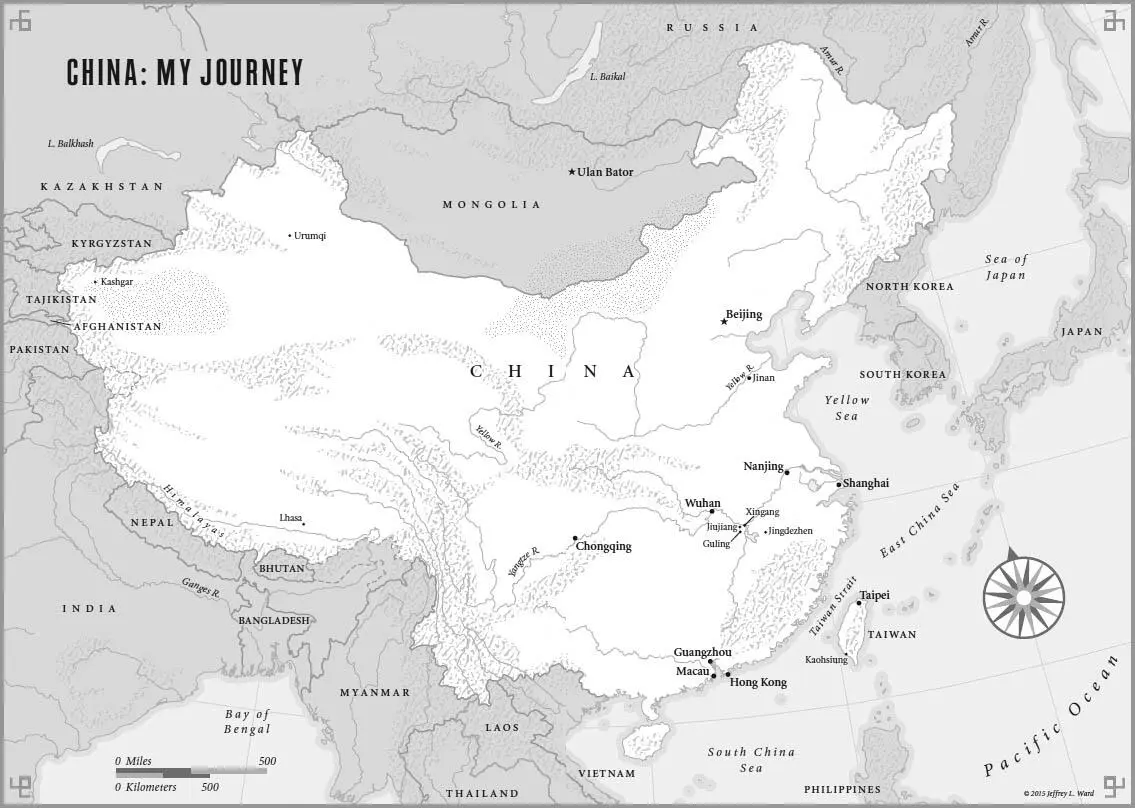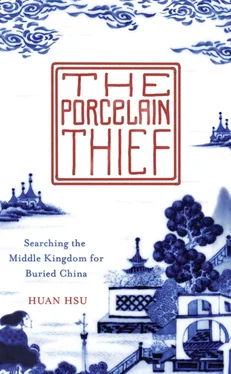Chinese kinship terms are manifold and complicated; depending on the relationship, each family member has a unique term by which they are called. I have simplified this by referring to characters either by their given names or according to their relationship to me, except for San Gu, my grandmother’s aunt. Full Chinese names are written with the surname first, followed by the given name.
Finally, all dates have been converted from the lunar calendar to the Gregorian calendar. And the conversion rate for Chinese RMB to U.S. dollars for this book is 7:1.

THE FIRST SIGN OF TROUBLE CAME IN THE SPRING OF 1938.
On the tails of the snow cranes leaving their wintering grounds in the Poyang Lake estuary, Japanese planes appeared in the sky, tracing confused circles as if they had lost their flock. It soon became clear that these reconnaissance planes were not stragglers but the vanguard for another kind of migration. After taking Beijing, Shanghai, and Nanjing, the Japanese army advanced through China not like a spreading pool of water but like a gloved hand, and in the summer of 1938 its middle finger traced up the Yangtze River toward my great-great-grandfather Liu Feng Shu’s village of Xingang.
Liu presided over one of the most prominent families in Xingang, situated on a spit separating the Yangtze River and Poyang Lake, China’s largest freshwater body, like a valve. His estate included most of the arable land along the river, worked by a small army of sharecroppers, and a number of residences at the western edge of the village, the largest being his own. Guarded by a trio of stately pine trees, the sprawling stone abode fronted the road heading into the nearby city of Jiujiang, a major trading and customs port. There lived a coterie of daughters-in-law, grandchildren, and servants; the eldest of Liu’s three sons, my great-grandfather, died of tuberculosis in his thirties, and his school-aged children, as well as those of Liu’s surviving sons, lived with him while their fathers worked elsewhere in the province, a common arrangement in Chinese families. My great-great-grandfather filled the rooms with objets d’art befitting a scholar who had passed the imperial civil service exam, including his prized collection of antique porcelain. Accumulated by the crate, some of the items dated back hundreds of years to the Ming dynasty and had once belonged to emperors, and for all my great-great-grandfather’s other forms of wealth, these heirlooms, as enduring as they were exquisite, best represented the apogee of both family and country. Across the road, beyond the communal fishpond, dug into a hill that gathered the setting sun, was the cemetery where eleven generations of his ancestors kept watch over his prosperity.
As the summer went on, phalanxes of Japanese bombers soared over Liu’s fields to drop ordnance on westerly cities, unencumbered by a Chinese army with pitiful air defenses. According to the newspapers that Liu picked up in the mornings from the general store down the road, Republic of China president Chiang Kai-shek was prepared to stage a vicious defense of Jiujiang and had nearly one million troops dug in along the Yangtze. The presence of Chinese soldiers became a regular sight in Xingang, if not a welcome one, given the Nationalist army’s reputation for incompetence and venality.
And now Chinese soldiers had taken up residence in Liu’s house. Despite outnumbering the Japanese three to one, the Chinese resistance lasted mere days. Xingang stood in the path of the retreat, and the army had no qualms about demanding food and board from the local gentry. The rice and firewood that Liu had set out for them was not enough, the soldiers said. They eyed the house’s heavy door bar and prepared to hack it apart for fuel. “You can’t use that for kindling,” Liu protested. “We need it to lock our door.”
The argument turned physical, and a pair of soldiers began to beat Liu with a stick. Three of his granddaughters had been herded into a back room out of sight of the soldiers and watched the commotion from a window, horrified, until they couldn’t bear it anymore. Pei Fu, the oldest one still at home, newly graduated from a Methodist boarding school, instructed Pei Yu, not yet a teenager, to run into the village and fetch the elders. Then she and Pei Sheng, the second youngest but the boldest, sprinted into the fray, jumping on the soldiers’ backs and thrashing them while they tried to pull their grandfather away. “You guys fought so poorly, ran away from the battle, and you still dare to hit an old man?” Pei Sheng shouted. “No wonder you’re losing the war!”
Pei Yu found the elders, who alerted the commanding officers, and all parties converged on the house. The girls explained what they had witnessed, and the elders vouched for the girls. The chagrined commanders forced the offending soldiers onto their knees before Liu and offered to execute them. “Oh, don’t kill anyone,” Liu said. “That’s not right, either. You come here and we give you food, a place to stay, and you act badly. As long as you understand what you did wrong, that’s enough.” He made them kowtow and apologize, and for the rest of their stay, the soldiers didn’t even dare to touch the firewood left out for them without first asking. “We’re afraid of what the three tigresses might do,” they said.
My great-great-grandfather was not naïve about war. In midlife he had witnessed the end of dynastic China and the birth of a republic when revolutionaries overthrew the Qing monarchy in 1911, ending more than two thousand years of imperial rule. Ten years before the Japanese encroached, Chiang Kai-shek’s campaign against local warlords had swept through the area, followed by sporadic skirmishes between Chiang’s Nationalists and the upstart Communists. Each time feng liu yun san, “the winds flowed and the clouds scattered”; the crisis passed. Liu’s wealth and land holdings continued to grow. Still, his blood curdled from the reports of Japanese soldiers sha ren ru ma, “killing people like scything grass,” in occupied cities. He especially feared for the granddaughters still living with him at home. Most of the village men of fighting age had already left home, eager to avoid death by the Japanese or, worse, conscription into the Chinese army. Liu was a widower in his seventies and could hardly be counted upon to protect his family. As he debated whether to flee everything he had spent a lifetime achieving, he must have wondered if perhaps this time things would not return to normal.
His eldest granddaughter—my grandmother—was safe, ensconced in neutral Macau as a high school chemistry teacher at a missionary school. He allowed Pei Fu, the second oldest and my grandmother’s middle sister, to marry into a family he despised, figuring a woman wedded to a good-for-nothing was still safer than remaining unmarried during wartime. He had already sent away his one grandson, the sole heir to the family fortune, with his youngest daughter, another science teacher whose local missionary school had relocated to the Chinese interior. That left my grandmother’s youngest sister, two of her cousins, a daughter-in-law, and a long-serving footman, Old Yang.
When the soldiers moved on, Liu and Old Yang waited for the sun to set and went into the garden with shovels and picks. Over the next few nights, they removed a patch of flax and dug a large hole, deeper than a man was tall and as wide as a bedroom, and lined the walls with bamboo shelving. Working by moonlight after the village had gone to sleep, they filled the vault with the family’s heirlooms: intricately carved antique furniture, jades, bronzes, paintings, scrolls of calligraphy, and finally, Liu’s beloved porcelain collection. Vases of every shape and size; painted tiles of Chinese landscapes; hat stands; figurines of the Fu Lu Shou, the trio of Buddhist gods that represented good fortune, longevity, and prosperity; decorative jars, plates, and bowls; tea sets; the dowries for his granddaughters. Liu and Old Yang packed the porcelain in woven baskets lined with straw, and once the vault could hold no more, they sealed it with boards, covered it with soil, and replanted the flax.
Читать дальше













